Choline Nootropic: Benefits, Uses & Side Effects

Choline Nootropic: A Deep Dive into Cognitive Enhancement
Choline, an essential nutrient, serves as a building block for crucial brain functions. Neither a vitamin nor a mineral, choline is a water-soluble nutrient linked to the B-vitamin family. Consequently, its role in cognitive health makes it a popular choice within the nootropic community. This comprehensive guide dives into choline as a nootropic, covering its various forms, notable benefits, potential side effects, and recommended dosages.
What is Choline? Understanding its Role in Cognition

Choline contributes significantly to brain development and function. It acts as a precursor to acetylcholine, a neurotransmitter vital for memory, learning, and muscle control. Therefore, maintaining adequate choline levels is crucial for optimal cognitive performance.
Acetylcholine: The Key Neurotransmitter
Acetylcholine, synthesized from choline, plays a pivotal role in many cognitive processes. Specifically, it influences:
Because of this, a choline deficiency can manifest as memory problems, difficulty concentrating, and even muscle weakness.
Choline’s Impact on Brain Structure
Beyond neurotransmitter synthesis, choline also contributes to the structural integrity of brain cell membranes. It’s a key component of phosphatidylcholine, a phospholipid that forms the outer layer of cell membranes. This structural role supports cell signaling and overall brain cell health.
Exploring Different Forms of Choline Supplements
Various forms of choline supplements exist, each differing in bioavailability and effectiveness. Therefore, understanding these differences helps in selecting the most appropriate form for individual needs.
Choline Bitartrate: A Budget-Friendly Option
Choline bitartrate is a cost-effective form of choline, consisting of choline combined with tartaric acid. Moreover, this combination improves its absorption compared to pure choline. Typically, choline bitartrate contains around 40% choline by weight. Despite being less potent than other forms, it remains a popular choice for nootropic stacks due to its affordability and accessibility.
Choline Chloride: Similar to Bitartrate
Choline chloride is another affordable form, consisting of choline bound to chloride. Its properties closely resemble choline bitartrate, offering a similar level of bioavailability and cost-effectiveness. Although affordable, some studies show it less efficacious than CDP-Choline.
CDP-Choline (Citicoline): The Cognitive Powerhouse
CDP-choline, also known as citicoline, stands out for its enhanced cognitive benefits. It contains approximately 18% choline by weight. More importantly, it raises phosphatidylcholine levels in the brain more effectively than other forms. Furthermore, CDP-choline provides cytidine, which converts to uridine. Uridine then supports brain cell health and synaptic plasticity. It’s often favored among “neurohackers” for its multitasking nootropic effects. It also enhances blood flow to the brain.
Here’s an example of a CDP-Choline supplement:

View Product
Alpha-GPC (Alpha-Glycerylphosphorylcholine): Superior Bioavailability
Alpha-GPC is another potent form of choline, known for its superior bioavailability. It readily crosses the blood-brain barrier, delivering choline directly to the brain. As a result, Alpha-GPC is highly effective in increasing acetylcholine levels and enhancing cognitive function. It also supports growth hormone release.
Consider these Alpha-GPC options:

View Product

View Product
Phosphatidylcholine: From Dietary Sources
Phosphatidylcholine is a phospholipid naturally found in foods like eggs, soy, and sunflower lecithin. Though it provides choline, its bioavailability as a direct choline source is less efficient than other supplement forms. It still contributes significantly to overall choline intake and supports cell membrane health.
Benefits of Choline as a Nootropic: Cognitive Enhancement and Beyond
Choline offers a wide array of benefits, particularly in enhancing cognitive functions and supporting overall brain health. Let’s delve deeper into these advantages:
Enhanced Memory and Learning
Choline’s primary role in acetylcholine production directly impacts memory and learning capabilities. Adequate choline levels improve the brain’s ability to encode new memories and retrieve existing ones. Studies suggest that choline supplementation can enhance both short-term and long-term memory.
Improved Focus and Concentration
Acetylcholine also plays a critical role in maintaining attention and focus. By boosting acetylcholine levels, choline supplements can improve concentration, making it easier to stay on task and avoid distractions. This is particularly beneficial for students, professionals, and anyone needing sustained mental effort.
Neuroprotection and Brain Health
Choline contributes to the structural integrity of brain cell membranes. It protects against age-related cognitive decline. Phosphatidylcholine, a key component of cell membranes, relies on sufficient choline levels to maintain its structure and function. Studies suggest choline may help prevent or slow the progression of neurodegenerative diseases.
Mood Regulation and Emotional Well-being
Choline influences the balance of neurotransmitters in the brain, including acetylcholine, serotonin, and dopamine. This balance is crucial for mood regulation and emotional stability. Some studies indicate that choline supplementation may help alleviate symptoms of depression and anxiety.
Supporting Liver Function
Besides its cognitive benefits, choline is also vital for liver health. It helps transport fats from the liver, preventing fat accumulation and supporting proper liver function. A choline deficiency can lead to non-alcoholic fatty liver disease.
Benefits Summary Table
| Benefit | Description |
|---|---|
| :—————————– | :———————————————————————————————– |
| Enhanced Memory & Learning | Improves encoding and retrieval of memories. |
| Improved Focus & Concentration | Enhances attention span and reduces distractions. |
| Neuroprotection & Brain Health | Supports brain cell structure and protects against age-related cognitive decline. |
| Mood Regulation | Helps balance neurotransmitters for improved mood stability. |
| Supporting Liver Function | Transports fats from the liver, preventing fat accumulation and supporting proper liver health. |
Clinical Research and Studies: What the Science Says
Numerous clinical studies support the benefits of choline supplementation. These studies highlight its effectiveness in improving cognitive function, protecting brain health, and supporting liver function.
Cognitive Function Studies
Several studies have demonstrated choline’s positive impact on cognitive performance.
Brain Health Studies
Choline’s neuroprotective properties have been a focus of many research efforts.
Liver Function Studies
Choline’s role in liver health has also been extensively studied.
Table of Clinical Studies
| Study Focus | Key Findings |
|---|---|
| :————————— | :———————————————————————————————————– |
| Cognitive Function | Higher choline intake associated with better cognitive performance and reduced dementia risk. |
| Memory Enhancement | Choline supplementation improves memory performance in healthy adults. |
| Brain Health | May slow the progression of Alzheimer’s disease and aid in stroke recovery. |
| Liver Function (NAFLD) | Choline supplementation reduces fat accumulation in the liver and improves liver function. |
Potential Side Effects and Precautions: What to Watch Out For
While choline is generally safe, excessive intake can lead to several side effects. Awareness of these potential adverse effects is crucial for safe and effective use.
Common Side Effects
The most common side effects of high choline intake include:
Serious Side Effects
Although rare, more serious side effects can occur with very high choline intake:
Precautions and Contraindications
Certain individuals should exercise caution or avoid choline supplements altogether:
Side Effects and Precautions Table
| Side Effect | Description |
|---|---|
| :————————– | :————————————————————————————————— |
| Fishy Body Odor | Production of trimethylamine resulting in a fishy odor. |
| Gastrointestinal Distress | Diarrhea, nausea, vomiting, and abdominal cramping. |
| Low Blood Pressure | Hypotension due to neurotransmitter regulation. |
| Neurotransmitter Imbalance | Mood swings, irritability, anxiety, and fatigue due to excessive acetylcholine depressing other neurotransmitters. |
| Precautions | TMAU, history of depression/anxiety, pregnancy/breastfeeding. |
Recommended Dosage and Usage: Finding the Right Balance
Finding the right dosage of choline is crucial for maximizing benefits while minimizing potential side effects. The recommended daily intake of choline varies depending on individual needs and specific health goals.
General Dosage Guidelines
Nootropic Dosage Recommendations
For nootropic purposes, dosages can range from 500 mg to 3,000 mg per day, depending on the form of choline and individual tolerance.
Timing and Administration
Choline supplements can be taken with or without food. However, taking them with a meal may improve absorption and reduce the risk of gastrointestinal distress.
Interactions with Other Nootropics
Choline is often stacked with other nootropics to enhance cognitive effects. Common combinations include:
Here are some products that you can stack with choline:

View Product

View Product
Dosage and Usage Table
| Choline Form | Nootropic Dosage Range | Administration | Interactions |
|---|---|---|---|
| :—————– | :——————— | :——————————————– | :——————————————– |
| Choline Bitartrate | 500 mg – 2,000 mg | With or without food, split doses | Racetams, caffeine, L-theanine |
| CDP-Choline | 250 mg – 1,000 mg | With or without food, split doses | Racetams, caffeine, L-theanine |
| Alpha-GPC | 300 mg – 600 mg | With or without food, split doses | Racetams, caffeine, L-theanine |
Conclusion: Optimizing Cognitive Function with Choline
Choline is a potent nootropic that offers many benefits for cognitive function and brain health. Understanding its different forms, benefits, potential side effects, and recommended dosages is crucial for safe and effective use. Whether you choose choline bitartrate, CDP-choline, or Alpha-GPC, incorporating this essential nutrient into your supplement stack can significantly enhance your mental performance and overall well-being. Remember to consult with a healthcare provider before starting any new supplement regimen to ensure safe and effective use. By carefully considering these factors, you can harness the cognitive benefits of choline to achieve optimal brain health and cognitive performance.
Choline Nootropic: A Deep Dive into Cognitive Enhancement
Choline, a water-soluble nutrient often grouped with the B-vitamins, is a critical building block for brain health and cognitive function. While not technically a vitamin or mineral, choline plays essential roles in various bodily processes, making it a popular and effective nootropic. Consequently, understanding its different forms, benefits, potential side effects, and proper dosages is vital for anyone seeking cognitive enhancement.
Unveiling the Different Forms of Choline
Several forms of choline are available as supplements, each differing in bioavailability and efficacy. Choosing the right form depends on your specific cognitive goals and individual response.
Choline Bitartrate (Bitartrate Choline)
Choline bitartrate represents a cost-effective option. It consists of choline bound to tartaric acid, improving its absorption. Typically containing around 40% choline by weight, it serves as a readily available choline source. Although more affordable, some consider it less efficient at crossing the blood-brain barrier compared to other forms. Therefore, higher doses might be required to achieve the desired cognitive effects. It’s frequently incorporated into pre-made nootropic stacks because of its affordability and accessibility.
Choline Chloride
Similar to bitartrate, choline chloride presents another budget-friendly alternative. However, it is generally less favored compared to bitartrate due to potential gastrointestinal side effects at higher doses. Some users report stomach upset when taking choline chloride supplements, so careful dosage titration is crucial.
Choline Citrate
Choline citrate binds choline to citric acid. Citric acid plays a vital role in transporting acetyl units from mitochondria for acetylcholine synthesis. This form may subtly enhance acetylcholine production, potentially offering mild cognitive benefits. However, limited research directly compares choline citrate to other forms in terms of nootropic efficacy.
CDP-Choline (Citicoline)
CDP-Choline, also known as citicoline, has gained recognition among neurohackers because it is not only about 18% choline but also performs other functions. It readily crosses the blood-brain barrier and breaks down into cytidine and choline. The cytidine is then converted into uridine, a nucleotide base also important for brain health. Besides boosting acetylcholine, CDP-choline also helps enhance the synthesis of phosphatidylcholine, a major component of cell membranes. This form offers comprehensive support for cognitive function and brain structure. This dual mechanism of action makes it a popular choice for promoting focus, memory, and overall cognitive vitality.
Alpha-GPC (Alpha-Glycerylphosphorylcholine)
Alpha-GPC stands out as a highly bioavailable form of choline. It effectively crosses the blood-brain barrier and readily converts to acetylcholine. This is a potent option for swiftly boosting choline levels in the brain. Notably, Alpha-GPC is also used to support athletic performance, potentially enhancing power output and muscle strength. Furthermore, Alpha-GPC contributes to the release of growth hormone, offering additional benefits for physical performance. However, due to its potency, some users might experience side effects such as headaches if the dosage is not carefully managed.
The Multifaceted Benefits of Choline as a Nootropic
Choline plays a central role in various cognitive processes, making it an attractive addition to any nootropic stack. Its cognitive benefits extend beyond simple memory enhancement.
Boosting Brain Energy and Mental Alertness
Choline aids in maintaining alertness and mental clarity. It facilitates the production of acetylcholine, a neurotransmitter heavily involved in attention and wakefulness. Maintaining optimal acetylcholine levels is crucial for staying focused and productive throughout the day. Choline can counter brain fog and mental fatigue, offering consistent cognitive support for demanding tasks.
Amplifying Memory and Cognitive Function
The connection between choline and memory function has been extensively studied. Choline is vital for both forming new memories and retrieving existing ones. By supporting healthy acetylcholine levels, choline boosts learning capacity and recall accuracy. This can lead to improved academic performance, enhanced problem-solving skills, and superior cognitive agility.
Supporting Neurotransmitter Balance
Choline influences neurotransmitter balance. Acetylcholine and serotonin have an inverse relationship. When acetylcholine levels are suboptimal, serotonin levels can become disproportionately high, potentially leading to mood swings or other issues. By optimizing acetylcholine, choline aids in stabilizing neurotransmitter levels. Consequently, it can positively influence mood stability, decrease anxiety, and promote overall cognitive well-being.
Enhancing Muscle Health and Recovery
Choline benefits go beyond brain function, extending to muscle health. It supports the synthesis of phosphatidylcholine, a crucial component of muscle cell membranes. Maintaining healthy cell membranes is crucial for muscle recovery after strenuous workouts. Choline can minimize muscle soreness, boost muscle strength, and improve overall physical performance.
Promoting Brain Structure and Function
Choline contributes significantly to the development of new brain cells and facilitates the repair of damaged cell membranes. This is particularly important as we age, since brain cell regeneration slows. Adequate choline intake supports long-term brain health, protecting against age-related cognitive decline. It also fosters neuroplasticity, the brain’s capability to reorganize itself by forming new neural connections throughout life.
Scientific Validation: Clinical Research and Studies on Choline
The nootropic potential of choline is backed by scientific research, illustrating its effectiveness in improving cognitive performance and overall brain health.
The Insightful Framingham Heart Study
The Framingham Heart Study, a long-term cardiovascular study, has provided valuable insights into the role of choline. The study revealed that adequate choline intake supports cardiovascular health and helps prevent cognitive decline. Specifically, higher choline levels are linked to reduced risks of dementia and Alzheimer’s disease. The study’s findings underscore the importance of choline for maintaining cognitive vitality throughout life.
Choline Bitartrate: Precision, Speed, and Accuracy
A specific study that focused on choline bitartrate demonstrated its positive impact on cognitive tasks. Participants supplemented with choline bitartrate experienced improvements in precision, speed, and accuracy during tasks. This suggests that choline encourages a bias toward cognitive enhancement, enabling individuals to process information more effectively and make quicker, more accurate decisions.
Cognitive Decline: Alzheimer’s Disease
Research has also explored choline’s potential in managing cognitive decline, particularly in Alzheimer’s disease. Choline supplementation has been shown to enhance memory function and slow the progression of cognitive impairment in the early stages of Alzheimer’s. While it is not a cure, choline could offer a supportive role in managing the symptoms and enhancing the quality of life for individuals affected by this neurodegenerative condition.
Safety Considerations: Side Effects and Precautions
Even though choline is generally safe, excessive consumption can lead to unwanted side effects. Being aware of potential adverse reactions is essential for safe and effective use.
Neurotransmitter Imbalance
Excessive acetylcholine can disrupt the balance of other neurotransmitters, including dopamine, norepinephrine, and serotonin. This imbalance can result in symptoms such as irritability, anxiety, depression, and fatigue. Monitoring mood and cognitive function is crucial when beginning choline supplementation.
Other Potential Side Effects
High doses of choline can lead to gastrointestinal issues, including diarrhea, constipation, gas, bloating, nausea, and vomiting. Some individuals also report dizziness, muscle weakness, tingling sensations, joint pain, and general discomfort when consuming excessive choline. Beginning with a low dose and slowly increasing it can help mitigate these side effects.
Optimizing Dosage: Recommendations for Cognitive Benefits
Determining the appropriate choline dosage depends on factors like the specific form of choline used, individual sensitivity, and the desired cognitive effects.
General Recommendations
The generally suggested daily intake of choline is around 500-600 mg for overall health maintenance. This amount can be sourced from diet or supplements. However, when using choline as a nootropic, dosages can range from 500 mg to 3,000 mg per day, depending on the particular form.
Specific Forms
For choline bitartrate, a starting dose of 500 mg per day is generally recommended, which can be gradually increased as tolerated. CDP-choline is often used at doses of 250 mg to 500 mg per day because of its higher bioavailability and potency. Alpha-GPC typically requires lower doses, such as 300 mg to 600 mg per day, to achieve the desired effects. It is often taken pre-workout due to its potential athletic performance benefits.
Importance of Individualization
It’s crucial to understand that the appropriate choline dosage varies among individuals. Some may experience significant cognitive benefits with relatively low doses, while others might require higher intakes to achieve comparable effects. Starting with a low dose and slowly adjusting it according to individual response is key.
Conclusion: Harnessing Choline for Cognitive Excellence
Choline represents a potent and versatile nootropic that can significantly enhance cognitive function and promote overall brain health. From improving memory and focus to supporting mood stability and protecting against age-related decline, choline offers a wide array of benefits for cognitive enhancement. Selecting the appropriate form of choline, carefully monitoring dosage, and remaining conscious of potential side effects are essential for a safe and successful experience. Before starting a new supplement regimen, it’s recommended to seek advice from a healthcare professional. Combining choline with a balanced diet, regular exercise, and sufficient sleep maximizes its cognitive benefits. Whether you are a student, professional, or simply seeking to optimize your cognitive function, integrating choline into your nootropic strategy can unlock cognitive performance and overall well-being.

